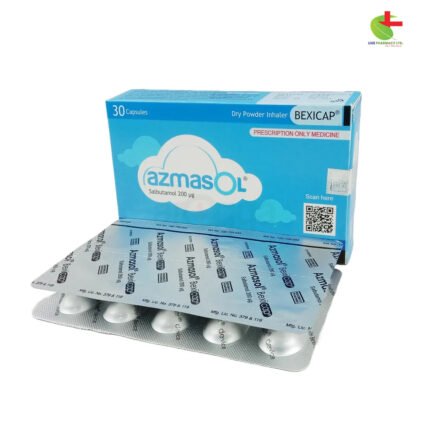Uroflo 0.4
100.00৳ Strip
- Uroflo Hydrochloride treats symptoms of Benign Prostatic Hyperplasia (BPH) by relaxing smooth muscles in the bladder neck and prostate.
- Contains Tamsulosin, a selective alpha1A adrenoceptor blocker that improves urine flow.
- Administered as a daily capsule, typically taken after a meal.
- Helps manage urinary obstruction with minimal side effects; follow dosage instructions and consult your healthcare provider.
 Brand
Brand
|
Beximco Pharmaceuticals Ltd |
|---|---|
 Generics
Generics
|
Tamsulosin Hydrochloride |
 Type
Type
|
Capsule |
Indications
Uroflo Hydrochloride is prescribed for the management of symptoms associated with Benign Prostatic Hyperplasia (BPH), including:
-
- Asthma
- Chronic bronchitis
- Emphysema
- Other conditions leading to airway obstruction
Pharmacology
Tamsulosin, a selective alpha1-adrenoceptor antagonist, specifically targets alpha1A receptors in the prostate. This selective action relaxes the smooth muscle in the bladder neck and prostate, improving urine flow and alleviating BPH symptoms. After oral administration, Tamsulosin is nearly completely absorbed, with a Tmax of 4-5 hours on an empty stomach and 6-7 hours with food. It is highly protein-bound (94-99%) and metabolized extensively in the liver, with a plasma half-life ranging from 9 to 15 hours depending on the population.
Dosage & Administration
Tamsulosin Hydrochloride 0.4 mg capsule should be taken daily after a meal. If needed, the dose can be increased to 0.8 mg after 2-4 weeks. If therapy is interrupted, resume with the 0.4 mg dose. Capsules should be swallowed whole with water, without chewing or crushing.
Interaction
Uroflo may interact with other alpha1-adrenoceptor antagonists, leading to hypotension. Concurrent use with cimetidine increases plasma levels, while frusemide decreases them, but dosage adjustments are not necessary. No significant interactions were noted with liver enzyme systems. Diclofenac and warfarin may accelerate Uroflo elimination.
Contraindications
Tamsulosin Hydrochloride is contraindicated in patients with known hypersensitivity, history of orthostatic hypotension, or severe hepatic impairment. It may cause blood pressure reductions leading to syncope; patients should be cautious with activities that could cause injury.
Side Effects
Common side effects include dizziness, abnormal ejaculation, and, less frequently, headache, fatigue, postural hypotension, and palpitations.
Pregnancy & Lactation
Use of Tamsulosin during pregnancy and lactation is not recommended due to potential risks.
Precautions & Warnings
Transient postural symptoms may occur, particularly after the first dose. It is advised to avoid use in patients with micturition syncope. There is no data on its impact on driving or machinery operation, but patients should be aware of potential dizziness.
Overdose Effects
Acute overdosage may lead to hypotension. Management includes supportive care, lying the patient down, and possibly using volume expanders or vasopressors. Dialysis is unlikely to be effective due to high plasma protein binding. Measures like emesis and gastric lavage may be considered for large doses.
Therapeutic Class
BPH/Urinary Retention/Urinary Incontinence
Storage Conditions
Store below 30°C, in a cool, dry place, away from light.













Reviews
There are no reviews yet.